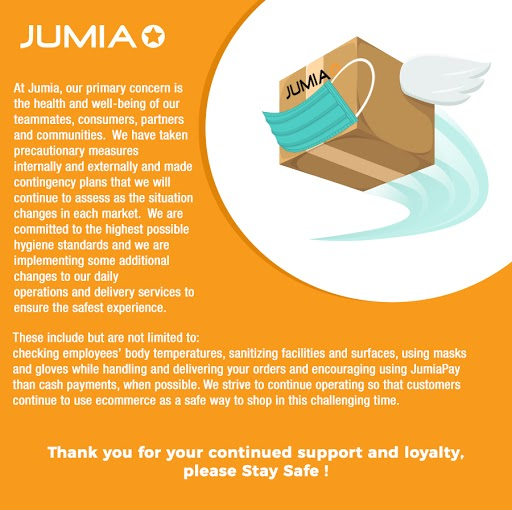News
Consumables dominate Jumia’s sales as buyer habits change
October 26, 2021Company News

NYSE-listed e-commerce platform Jumia experienced a shift in shopping habits across its markets in Africa last year, as more shoppers bought everyday products as opposed to electronics.
Shopping for essentials such as foodstuff, fashion and beauty products saw Jumia’s total sales value of Fast-Moving Consumer Goods grow by 13 percentage points last year, from 44% in 2019, according to the newly released Jumia Africa E-commerce Index 2021 report.
The Jumia report attributed the shift to stay-at-home restrictions that fueled the need for online shopping as well as the youthful population and the increasing smartphone and internet penetration across the continent. Smartphones contributed 75% of the traffic to the e-commerce site.
“By providing consumers with access to essential food and services, we have seen a shift to essential related products from phones and electronics. This goes to show how COVID-19 also reinforced the relevance of e-commerce in the communities we serve,” Jumia Group’s head of communication and public relations, Abdesslam Benzitouni, told TechCrunch.
Jumia said that more sellers signed up to Jumia Mall — a platform for official brands within the main site — increasing the shopping options and providing a wide variety of products. Jumia is currently the biggest e-commerce platform in Africa, leading hundreds of others, including Chinese-owned Kilimall, Nigeria’s Marketplace Africa and South Africa’s bidorbuy.
“The brands (on Jumia Mall) know e-commerce is the future. Having them on Jumia means that consumers have access to their products, and that brands are within their reach. Different sellers on the platform also means that we create transparency and competition between brands.”
The report, prepared in partnership with the United Nations Conference on Trade and Development, International Finance Corporation, and Mastercard, also showed that 28 million orders were made on the platform last year. Lagos, Cairo and Nairobi accounted for the most orders by volume, respectively.
About 35% of orders made through Jumia were paid using the company’s finance arm, Jumia Pay, an app that allows customers to pay utility bills and make orders without leaving the company’s platforms. Popularity of the Jumia brand also grew in all its markets with Uganda, Senegal and Tunisia experiencing the greatest growth.
Jumia attributed the growth currently happening within the continent’s e-commerce sector to the increasing, albeit sluggish, penetration of the internet. Across sub-Saharan Africa 303 million people, about 28% of the population, are connected to the mobile internet according to the 2021 GSMA mobile economy report. This is expected to grow to about 40% of the population by 2025, offering a bigger market to internet-based businesses like Jumia. But e-commerce uptake in Africa remains low, according to a recent International Trade Centre (ITC) report, with only 10 countries accounting for 94% of online business. Nigeria, South Africa and Kenya accounted for most online sales in sub-Saharan Africa.
“…the digital and economic infrastructure in Africa greatly affects e-commerce and helps explain why the online economy works better in some countries than in others,” said the ITC report.
“Furthermore, more than half of the people in 60% of African countries live in rural areas. Internet connectivity tends to be poor in these areas, which are also far from distribution centers — meaning that delivery services for goods are either poor, non-existent or costly. All of this creates sizable obstacles for e-commerce,” it said.
When compared to cities, rural areas accounted for 22% of the orders lodged on the Jumia site, which Benzitouni attributed to the e-commerce’s growing logistics network. He said that Jumia has over the last nine years built a logistics network that targets to make it possible for people in remote areas to shop on its site.
Jumia plans to use its logistics network to tap rural areas — which the firm says has seen a strong demand for its services in those areas. The e-commerce platform opened up its logistics marketplace to third parties, a place that was previously only used by food vendors and for e-commerce.
It now has 300 logistics partners and 1,600 pick-up stations spread across its 11 markets in Africa, including Algeria, Senegal, Tunisia, Uganda, South Africa, Nigeria and Morocco.
By last year Jumia had about 110,000 annual sellers and 6.8 million active customers, a small number when compared to the continent’s population. The growth of e-commerce across the continent, the ITC report said, is hampered by the lack of cross-border opportunities as most platforms operate within national borders. It said that the opportunity exists for a marketplace that can have a significant pan-African presence.
Read the original article on TechCrunch
About Jumia
Jumia is a leading e-commerce platform in Africa. Our marketplace is supported by our proprietary logistics business, Jumia Logistics, and our digital payment and fintech platform, JumiaPay. Jumia Logistics enables the seamless delivery of millions of packages while JumiaPay facilitates online payments and the distribution of a broad range of digital and financial services.
Follow us on, Linkedin Jumia Group and X @Jumia_Group
For more information about Jumia:
Abdesslam Benzitouni
[email protected]


